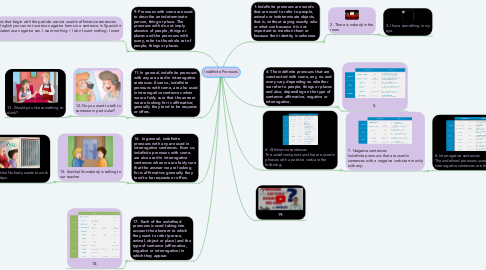Indefinite Pronouns
by Emely Iglesias


1. 9- Pronouns with some are used to describe an indeterminate person, thing or place. The pronouns with do not imply absence of people, things or places and the pronouns with every, refer to the whole set of people, things or places.
1.1. 10- Pronouns that begin with the particle are not used in affirmative sentences because in English you can not use two negative forms in a sentence. In Spanish it will be translated as a negative sen. I want nothing. / I don't want nothing. I want nothing.
2. 11- In general, indefinite pronouns with any are used in interrogative sentences. Even so, indefinite pronouns with some, are also used in interrogative sentences when we are fairly sure that the answer we are looking for is affirmative; generally they tend to be requests or offers.
2.1. 12- Do you want to talk to someone in particular?
2.1.1. 13- Would you like something to drink?
3. 14- In general, indefinite pronouns with any are used in interrogative sentences. Even so, indefinite pronouns with some, are also used in interrogative sentences when we are fairly sure that the answer we are looking for is affirmative; generally they tend to be requests or offers.
3.1. 15- (he/she) Somebody is talking to our teacher.
3.1.1. 16- (he/she) Nobody wants to work on Sundays.
4. 17- Each of the undefined pronouns is used taking into account the element to which they want to refer (person, animal, object or place) and the type of sentence (affirmative, negative or interrogative) in which they appear.
4.1. 18-
5. 6- Affirmative sentences The undefined pronouns that are used in phrases with a positive verb are the following:
5.1. 7- Negative sentences Indefinite pronouns that are used in sentences with a negative verb start mainly with any:
5.1.1. 8- Interrogative sentences The undefined pronouns used in interrogative sentences are the following:
6. 1- Indefinite pronouns are words that are used to refer to people, animals or indeterminate objects, that is, without saying exactly who or what son because it is not important to mention them or because their identity is unknown.
6.1. 2- There is nobody in the room
6.1.1. 3- I have something in my eye.
